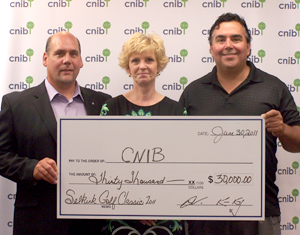Q&A – How to Pitch Corporate Donors for Your Charity
March 27, 2015
5 min read
In a recent Medium article, business and social media guru Gary Vaynerchuk compared fundraising to sales. Vaynerchuk argued that charities have been ignoring the needs of the “customer” in their appeals, and should be taking more of a sales-oriented approach to fundraising.
In the context of corporate donors, the rules of sales apply to an even larger degree. Corporate donors want to see return on their charitable investment, and are looking for the businesses benefits that charity can provide. And fortunately, there are many.
To get some tips on how charities can effectively approach corporate donors, we went to Rory Green, Associate Director, Advancement for the Faculty of Applied Science at Simon Fraser University in Vancouver. Rory’s passion is donors: how to listen to them, how to talk to them and how to help them feel joy through philanthropy.
Meet Rory
Rory Green is the Associate Director, Advancement for the Faculty of Applied Science at Simon Fraser University in Vancouver, BC.
Before this position, she worked in major and corporate giving at BCIT and the Canadian Cancer Society.
In her spare time, Rory is the founder and editor of Fundraiser Grrl, the fundraising community’s go-to source for comic relief.
Q: How has corporate giving changed in the last decade?
A: Traditionally corporate giving has been based on two notions: companies have lots of money, and companies want logos on event T-shirts.
Today, there are more non-profits than ever competing for corporate sponsorship dollars, and companies are starting to question the ROI of gold/silver/bronze sponsorship for races and walks.
The charities that are having the most success working with companies are the ones creating custom partnership proposals based on the mutual goals and needs of the charity and the company.
Traditionally, I think corporate giving looked like this:
And now I think these are much better examples:
Q: What should charities find out about a company before approaching it as a potential corporate donor?
First, you need to realize that just because a company has money, does not mean it will give you money. Look for companies whose interests, goals and values align with yours.
Before putting a proposal in front of a company, it’s important to understand:
- What do they do?
- What are their biggest challenges?
- What will they be tomorrow?
- Who are their clients or customers?
- How do they find new business?
- What is their culture like?
- What makes their company unique?
- Why do their customers chose them over their competitors?
- What are their Corporate Social Responsibility (CSR) goals and objectives?
- What have they liked about past non-profit partnerships? What has worked well? What hasn’t?
Q: Should charities approach corporate donors with a specific campaign or event, or be open to creating a specific arrangement with the corporate donor?
A: Charities need to go into a relationship with a corporate partner with an open mind. Start by getting to know the company, and then look for events and programs to match them with.
We can get “event blindness” in fundraising – where the only thing we think about is our upcoming gala or race. Pick ways to get involved that match the company’s interests and needs – not your own short-term goals. You will have much more success that way.
Q: What is the most typical CSR-related return on investment corporate donors are looking for and how can charities fulfill it?
A: Companies can benefit a great deal from working with a charity. Typical ROI for a company includes:
- Employee engagement: 70% of people say cause factors into where they work; this rises to 87% for Millennials (2010 Cone Cause Evolution Study)
- Attracting new clients or customers: A recently released study by cause marketing firm Cone Communications announced that an astounding 94% of customers would switch brands if it was associated with a good cause
- Enhanced customer service for existing customers: 71% of people would recommend cause-related brands according to a 2012 Edelman Goodpurpose Global Study
- Increased sales: 50% of global consumers said they would be willing to reward companies that give back to society by paying more for their goods and services (Nielsen 2013 Consumers Who Care Study)
Companies can do well by doing good! The more ROI a charity can offer a company, the more pots of money they can tap into, including the marketing budget, the HR budget and more!
Q: What are your best tips to charities for effectively pitching a new potential corporate donor?
A: First, get to know the company and its needs. Then ask yourself “how does this partnership help them meet their business needs?” Match them with programs or events that help them meet their needs.
When pitching the partnership, make the proposal company-centric – repeat back to them their goals, values, needs and objectives and clearly show how a partnership with your charity can help them get there.


